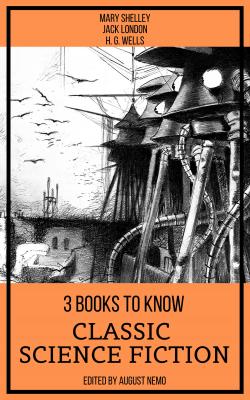ТОП просматриваемых книг сайта:
3 Books To Know Classic Science-Fiction. H. G. Wells
Читать онлайн.Название 3 Books To Know Classic Science-Fiction
Год выпуска 0
isbn 9783967993271
Автор произведения H. G. Wells
Жанр Языкознание
Серия 3 books to know
Издательство Bookwire
Table of Contents
|
|
|
Introduction
Welcome to the 3 Books To Know series, our idea is to help readers learn about fascinating topics through three essential and relevant books.
These carefully selected works can be fiction, non-fiction, historical documents or even biographies.
We will always select for you three great works to instigate your mind, this time the topic is: Classic Science-Fiction.
The War of the Worlds by H.G. Wells.
Frankenstein by Mary Shelley.
The Scarlet Plague by Jack London.
The War of the Worlds is a science fiction novel by English author H. G. Wells. At the time of publication, it was classified as a scientific romance, like Wells's earlier novel The Time Machine. The War of the Worlds has been both popular and influential. It was most memorably dramatized in a 1938 radio program that allegedly caused public panic among listeners who did not know the Martian invasion was fictional.
Frankenstein; or, The Modern Prometheus is a novel written by English author Mary Shelley that tells the story of Victor Frankenstein, a young scientist who creates a hideous, sapient creature in an unorthodox scientific experiment.
The Scarlet Plague is a post-apocalyptic fiction novel written by Jack London and originally published in London Magazine in 1912. The story takes place in 2073, sixty years after an uncontrollable epidemic, the Red Death, has depopulated the planet.
This is one of many books in the series 3 Books To Know. If you liked this book, look for the other titles in the series, we are sure you will like some of the topics.
|
|
|
Authors
Herbert George Wells (21 September 1866 – 13 August 1946) was an English writer. He was prolific in many genres, writing dozens of novels, short stories, and works of social commentary, satire, biography, and autobiography, and even including two books on recreational war games. He is now best remembered for his science fiction novels and is often called a "father of science fiction", along with Jules Verne and Hugo Gernsback.
Mary Wollstonecraft Shelley (30 August 1797 – 1 February 1851) was an English novelist who wrote the Gothic novel Frankenstein; or, The Modern Prometheus (1818). She also edited and promoted the works of her husband, the Romantic poet and philosopher Percy Bysshe Shelley. Her father was the political philosopher William Godwin, and her mother was the philosopher and feminist Mary Wollstonecraft.
John Griffith London (January 12, 1876 – November 22, 1916) was an American novelist, journalist, and social activist. A pioneer in the world of commercial magazine fiction, he was one of the first writers to become a worldwide celebrity and earn a large fortune from writing. He was also an innovator in the genre that would later become known as science fiction.
|
|
|
The War of the Worlds
by H.G. Wells
––––––––
‘But who shall dwell in these worlds if they be inhabited?
. . . Are we or they Lords of the World? . . . And
how are all things made for man?’
KEPLER (quoted in The Anatomy of Melancholy)
––––––––
Book One
The Coming of the Martians
––––––––
I – The Eve of the War
––––––––
No one would have believed in the last years of the nineteenth century that this world was being watched keenly and closely by intelligences greater than man’s and yet as mortal as his own; that as men busied themselves about their various concerns they were scrutinised and studied, perhaps almost as narrowly as a man with a microscope might scrutinise the transient creatures that swarm and multiply in a drop of water. With infinite complacency men went to and fro over this globe about their little affairs, serene in their assurance of their empire over matter. It is possible that the infusoria under the microscope do the same. No one gave a thought to the older worlds of space as sources of human danger, or thought of them only to dismiss the idea of

